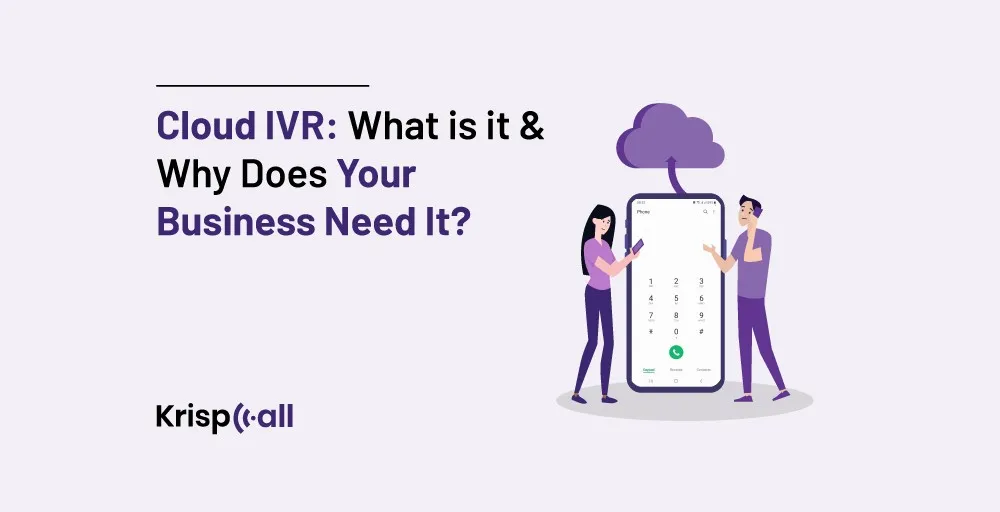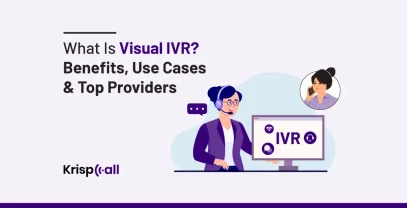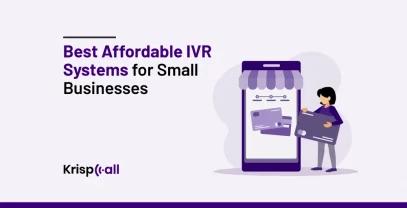As businesses grow and rapidly develop, ensuring that customers are heard is more important than ever. Cloud IVR is another technology that has surprised companies in dealing with their clients.😊
Cloud IVR transforms businesses by reducing costs, enhancing scalability, improving customer experiences, and boosting operational efficiency. It also revolutionized customer service strategies and drove business success.🚀
But what is cloud IVR, and why should it be considered vital for the company?
In this blog post, you will learn about Cloud IVR, its benefits, and some of the best cloud-based IVR providers.
🔏KEY HIGHLIGHTS
- Cloud IVR is a service where the customer can directly interact with automated voice messages, perform operations such as payment, or get connected to the right agent.
- Cloud IVR offers several benefits, including advanced features, cost savings, enhanced agent productivity, and improved customer experience.
- Traditional IVR is expensive, and the security and update responsibilities may lie with the company.
- Cloud-based IVR is cheaper and more easily scaled, and it offers a range of features and improvements that can be customized to the provider’s needs.
What is Cloud IVR?
Cloud IVR is an IVR service where the customer can directly interact with automated voice messages, perform operations such as payment, or get connected to the right agent or department.
It is similar to traditional IVR systems but is cloud-based and doesn’t require platforms within the company’s premises.
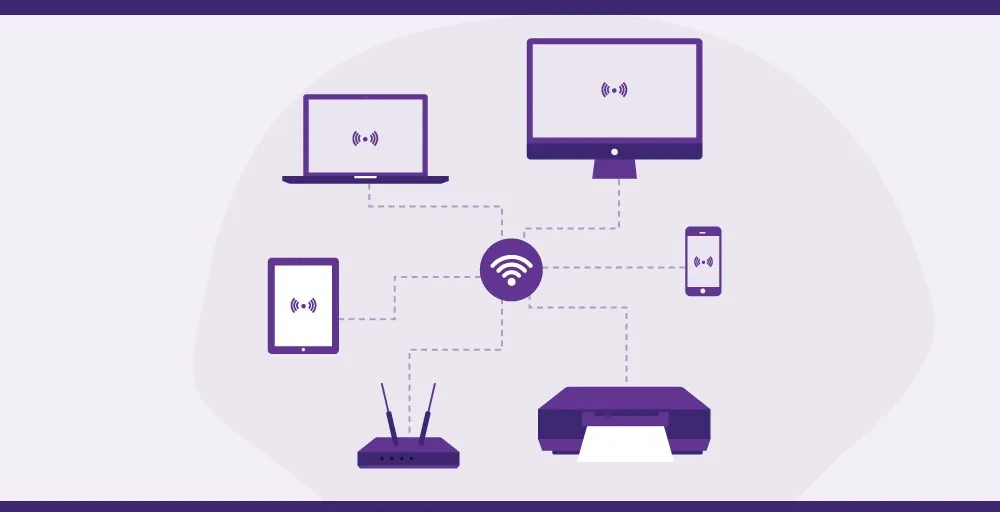
Similarly, Cloud-hosted IVR, like most cloud-based applications, works on the usage model. It means that one pays for the resources consumed. This eliminates the need to own and maintain their own hardware, making it economical for firms and organizations.
Using cloud IVR, organizations can enhance the effectiveness of their customers’ communications and reduce the time spent on related tasks. This contemporary approach fits well into modern society’s rapidly changing business environment.
What are the Benefits of Cloud IVR?
Cloud IVR, or Interactive Voice Response, offers numerous advantages to businesses and organizations. Here are some of its major benefits:
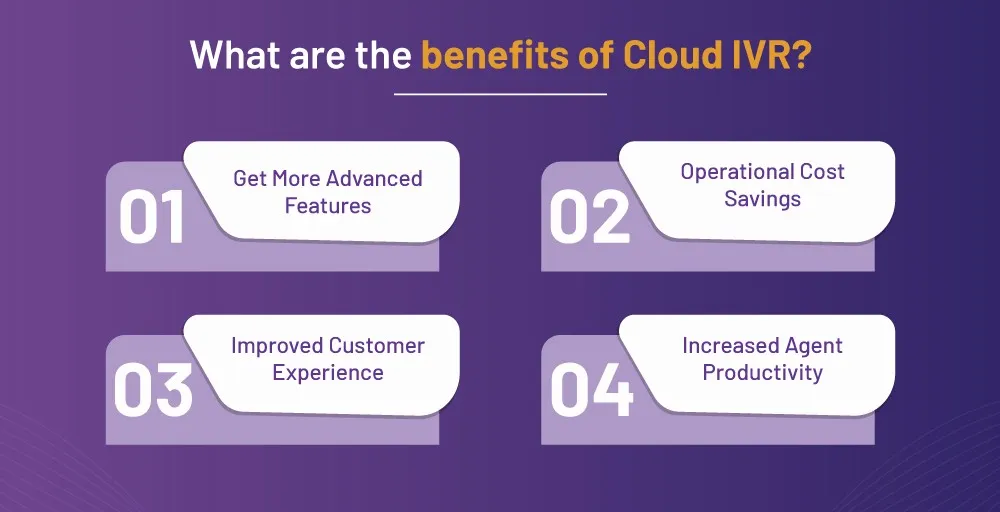
1. Get More Advanced Features
Cloud IVR based on a subscription model offers enhanced capabilities at affordable rates, contrasting with costly and inefficient on-premises systems. For instance, cloud IVR offers several features, such as conversation intelligence, call flows, extended data analysis, and VoiP CRM integration.
These are cheaper to implement and can easily be modified as the business grows and expands. Also, feature updates are frequent in cloud-based services, making your system always advanced and capable of addressing customers’ needs without reinvestment in new system technologies.
2. Operational Cost Savings
Among the most compelling advantages of Cloud IVR is the actual reduction in operating expenses. By implementing cloud solutions, the companies do not have to invest in expensive equipment and support systems infrastructure. This eliminates large up-front investments in capital equipment and continuous costs of equipment maintenance.
Also, the subscription-based pricing policy is considered one of the most effective ones as it enables only paying for the resources used, possibly scaling the costs up or down according to necessity.
This also eliminates the need for a separate IT department or a dedicated receptionist to handle the IVR system, which means more labor cost savings.
3. Improved Customer Experience
Cloud IVR also effectively delivers self-service to customers, thus improving customer satisfaction. It allows customers to check balances, pay bills, and obtain information, thus reducing the hold times agents spend with customers.
Likewise, this makes agents available for other, more complex issues, enhancing service quality. Further, it streamlines payments, allows integration with CRM tools for client-friendly services, and sends reminder notices and callbacks, increasing customer satisfaction and retention.
4. Increased Agent Productivity
Cloud IVR improves call center effectiveness and efficiency in that issue as it provides high first-call resolution (FCR), guaranteeing that customer issues are resolved on the first call and eliminating the need for follow-up calls. It also applies efficient call routing and agent classification to facilitate the assignment of customers to the right agents in order to enhance service delivery.
Also, the Cloud IVR can efficiently distribute workload among several agents through the Ring Groups concept to ensure that one agent is not overloaded with work. This means that processes are simplified and callers are properly directed to agents, all enhancing total agent efficiency.
Cloud-based IVR Vs. Traditional IVR
Here are the features of Cloud IVR and Traditional (On-Premise) IVR for comparison. Cloud IVR can be cheaper and more easily scaled, with a range of features and improvements that can be rolled out as often as the service provider wants.
On the other hand, Traditional IVR may be expensive, and the security and update responsibilities may lie with the company, thus offering the company more control but also more responsibility.
| Feature | Cloud IVR | Traditional (On-Premises) IVR |
| Costs | This is an extremely cost-effective solution. There are no equipment investments, and users only pay for the bandwidth/traffic used. | It is costly, as server installation and maintenance are necessary; the company pays for all security and updates for its website. |
| Scalability | Easily scalable product by having a chance to add users or upgrade your existing package. | Scaling up costs time and money as well. |
| Technology | Offers more features and is regularly updated through cloud servers. | It can be advanced, but the level depends on the financial and human capital that the firm is ready to invest in the marketing function. |
| Security | Security can be procured by the host company. | Company security is managed by the company itself, giving more control; however, it requires more effort. |
| Control | Accounts are controlled to a lesser extent; the management responsibility belongs to the service provider. | More flexibility and accuracy decrease the possibility of human errors, but it needs expertise from the IT department. |
5 Best Cloud-Based IVR Providers
These five options stand out as the best IVR service providers, offering innovative solutions tailored to businesses seeking seamless customer interactions:👇
1. KrispCall
KrispCall provides one of the best IVR systems in over 100 countries and has been adopted and endorsed by thousands of companies worldwide. It provides 24/ 7 dedicated human support, all the necessary tools and features for business telephony, an intuitive platform, and affordable prices to meet the needs of different companies.
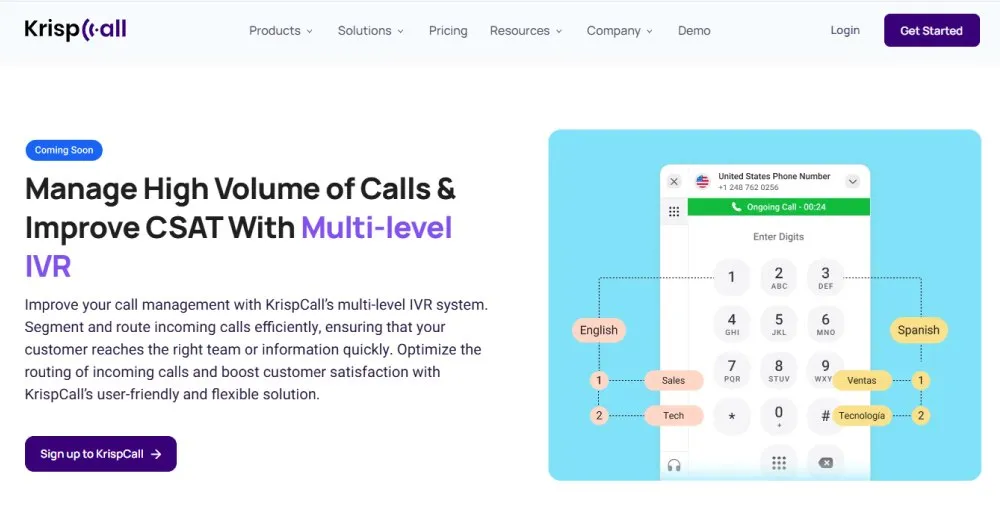
It has a uniquely easy-to-use programmable single-level IVR Phone Tree and multilevel IVR builder for creating custom call flows, and the application supports multiple languages to improve customer communication.
KrispCall’s phone system can become a vital part of a business, as it provides a reasonable subscription plan, a simple and intuitive interface, and numerous unique features for customers who choose a cloud-based phone system.
🌟Features
- Call Forwarding: Never miss a call. Customizable call forwarding for busy professionals
- Call analytics: Track the trends and identify call data patterns for predicting future needs and make proactive adjustments to your organization
- Scalability: Adapt resources up or down as your needs
- Unified Callbox: One convenient place to communicate effortlessly and instantly with your teams and customers
- Voicemail: Never miss a message, even if you are unavailable
✅Pros
- Reduces staff requirements.
- Minimizes tasks continually so the staff can promptly respond to issues without occupying most of their time.
- It can fit the needs and patterns of various scales of companies’ development.
- Make it possible for the team to meet and achieve higher levels of productivity and, at the same time, direct its efforts towards essential activities.
❌Cons
- Not available on Linux.
2. Twilio
Twilio is a cloud communications platform that helps its clients create IVR right from the start. The targeted IVR system provided by Twilio enables users to select only those functionalities they require, creating a highly tailored and economically viable system.
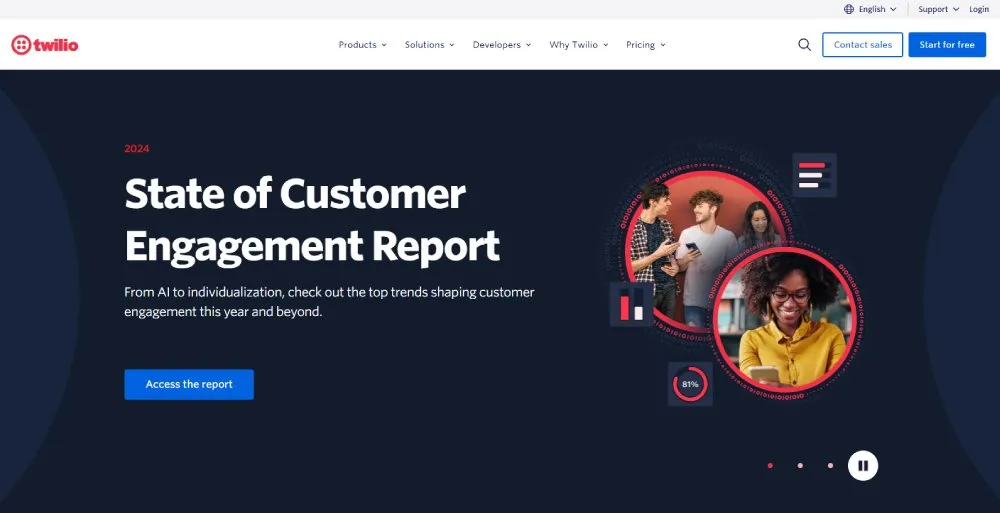
In Twilio Studio, users can drag components onto their customer journey, set up call paths, caller IDs, and phone numbers, and input customer information. Customers can also link their currently used CRM software with Twilio IVR to get brief details of the client.
🌟Features
- IVR communication via voice, WhatsApp, and Facebook Messenger
- Ability to loop prerecorded IVR audio files
- Speech recognition with real-time transcriptions
- Connects to payment gateways Stripe, Chase, Base, and CardConnect
- Mobile phone and desktop computer access
✅Pros
- Offers extensive customization.
- The pricing plans are flexible.
- It provides free trials before purchasing.
❌Cons
- Comparatively complex and limited features.
- Expensive pricing.
3. CloudTalk
CloudTalk is a cloud phone system provider offering a multi-level IVR, one of the main components of a comprehensive cloud call center software suite.
Its call flow designer tool can enhance your IVR with features like welcome prompts, time-based call transfers, business hours, and more. This means that admins can choose to have the IVR transfer calls involving specific subjects or needs for particular agents, either the preferred agent or a group of agents under a given ring group.
The most noticeable is the “Go-To” tool within the call design flow: This allowed admins to replicate sections of a call path, including call patterns of one or more phone numbers for another.
🌟Features
- Call-to-fax routing
- Personalized voice prompts/hold music
- Routing to voicemail
- Forward-to-phone from IVR
- Call recording
✅Pros
- Helps to gain visibility into call operations.
- Offers simple and supported setups.
- Offers affordable pricing for small businesses.
❌Cons
- After purchasing the package, it cannot be upgraded without contacting support.
- Text-to-speech recording for options isn’t available.
4. Goto Connect
Goto Connect is a cloud-based contact center solution tailored for an open-source dial plan. Its IVR system easily handles large call traffic and seamless multimodal interactions. It simplifies communication processes and supports interacting with common CRM platforms and tools.
Another feature that makes Goto Connect stand out is its dial plan editor. After dialing a number, users can edit a dial plan to get exactly the call routing they want.
Due to its intuitive design, the platform’s setup and configuration can be easily done even with minimum IT knowledge.
🌟Features
- Visual Dial plan editor
- Drag and drop interface.
- Real-time analytics and reporting
- Shared contacts and customer history for personalized experiences
- Customization beyond basics.
✅Pros
- Enables effective call monitoring.
- Personalized touch with customizable greetings.
- Offers financial flexibility.
❌Cons
- It might deliver more features than what a small business needs.
- It might be challenging for new users.
5. Zoom Phone
Zoom Phone is another solution with a fairly decent cloud IVR system available. It is easy to set up and connects to other ZoomSuite tools, including materializing and collaboration.
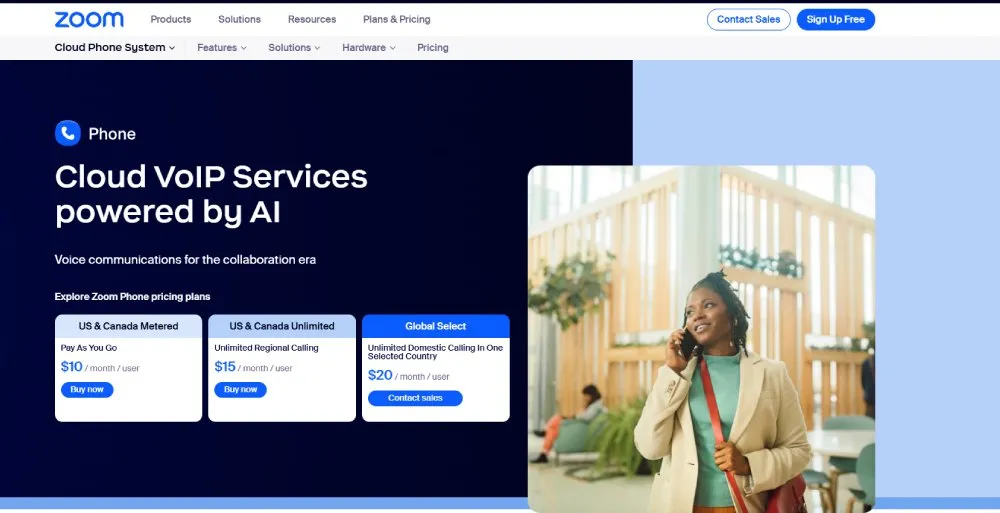
Zoom Phone improves business communication through cross-channel communication support, including additional features, such as recording calls, and dependable infrastructure.
Another major benefit of Zoom Phone is that Communication Channels can be easily integrated into voice, video, and messaging platforms, allowing companies to interact with customers and co-workers in multiple ways.
🌟Features
- Integrated scalability
- Cloud-based scalable architecture
- Adaptable for startups and enterprises
- Shared line group
- Call transfer
✅Pros
- User-friendly interface.
- Reliability across locations.
- Global call routing for multiple locations.
❌Cons
- Limited customization.
- Third-party integration is required for CRM features.
Wrapping Up
Businesses must understand their customers’ needs and deliver solutions that satisfy them. An IVR solution can streamline customer service operations, reducing costs and improving ROI.🚀
Similarly, by integrating Interactive Voice Response software, businesses can elevate their customer service standards while efficiently managing internal processes. Achieving high levels of customer satisfaction is essential for business success, and IVR systems play a pivotal role in achieving this goal.
We suggest exploring KrispCall, a cloud-based virtual phone system that offers IVR functionality and advanced features, including auto attendant, smart dialer, intelligent call routing, and more.💫
🤩Schedule a free KrispCall demo today to experience these benefits!
FAQs
How do I choose the right cloud IVR provider?
To select the best Cloud IVR provider, consider some of the most important aspects, such as cost, flexibility, functionality, uptime, and support services, to ensure successful integration and further support.
What is the difference between hosted and cloud IVR?
Hosted IVR typically refers to a system where a third-party service provider hosts the IVR software and hardware in their data center. On the other hand, Cloud IVR specifically leverages cloud computing infrastructure, utilizing resources and services provided over the internet.
What are the common challenges in implementing a cloud IVR system?
Some key issues associated with Cloud IVR system implementation include Interfaces with legacy systems, Data Security, and informal end-user training. Furthermore, offering operability and quality services at certain pike traffic presents challenges that need efficient structures and monitoring.
What Is an IVR call flow?
A call flow of an IVR system is the process followed by the callers during their communication through voice on the telephone, where the IVR system directs and guides the callers according to the menu options and extends the call to fulfill the callers’ purpose.
What are the key features of cloud IVR solutions?
Some of the key features of Cloud IVR solution are:
- Advanced call routing
- Scalability
- Customizable call flows
- Integration with CRM systems
- Multichannel support (voice, SMS, chatbots)
- Analytics and Reporting
- Self-service options
- Automated callbacks
- PCI-compliant payment processing

